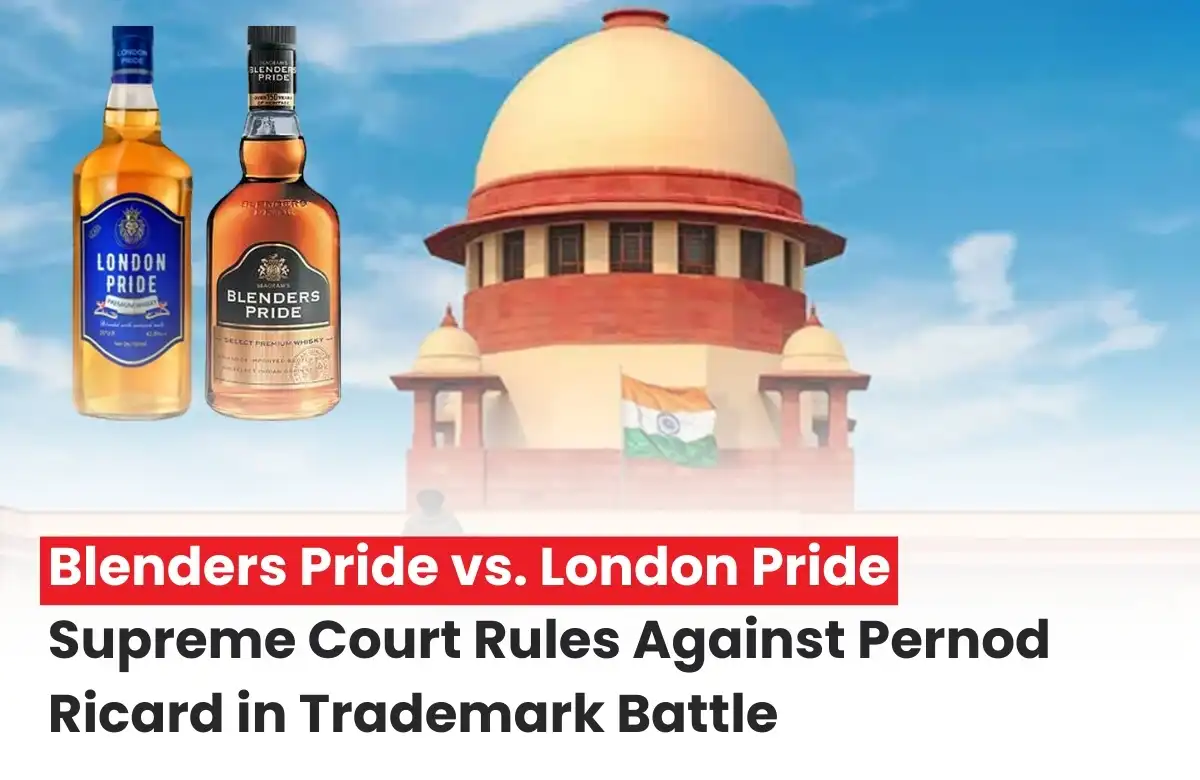
Another trademark battle has come into the spotlight, this time between global liquor giant Pernod Ricard, maker of the popular whisky brand Blenders Pride, and London Pride, owned by Karanveer Singh Chhabra of JK Enterprises. The Blenders Pride vs London Pride trademark dispute moved through the lower courts before finally reaching the Supreme Court of India, where Pernod Ricard’s appeal was dismissed. The company had argued that London Pride’s bottle design and packaging looked deceptively similar to its own well-known trademarks, but the court did not find enough grounds to support that claim.
Background of the Blenders Pride vs. London Pride Trademark Dispute
The roots of this dispute trace back to 2022, when Pernod Ricard India—the company behind popular whisky labels such as Blenders Pride, Imperial Blue, and Royal Stag—took notice of a new entrant in the Indian market. This was London Pride, a whisky brand introduced by JK Enterprises, owned by Karanveer Singh Chhabra.
According to Pernod Ricard, this is a case of trademark infringement. London Pride had appropriated key aspects of trade dress and brand identity from its whisky portfolio. They maintained that the use of similar marks, packaging features, and visual presentation posed a serious risk of consumer confusion and dilution of goodwill.
For the company, this was more than just a coincidence — it was a potential cause of consumer confusion. Pernod argued that an ordinary buyer might mistake London Pride for one of its established labels, such as Blenders Pride or Imperial Blue. The French liquor giant was also deeply concerned that the new brand was attempting to capitalize on the reputation and goodwill that Pernod had built over decades in the Indian whisky market. In their view, London Pride was not only imitating their look and feel but also trying to ride on the success of their legacy brands to gain quick recognition and profits.
After this, Pernod Ricard did not hold back, and in 2022, in India, the company filed a case against JK Enterprises and its owner, Karanveer Singh Chhabra. The lawsuit was initiated before the Commercial Court in Indore, Madhya Pradesh, marking the formal beginning of the legal battle over the alleged similarities between Blenders Pride and London Pride.
Read Also: Gauhati University’s Herbal Anti-Obesity Patent Marks Major Breakthrough
Blenders Pride vs London Pride: Supreme Court Rules Against Pernod Ricard in Trademark Dispute
However, the country’s top court had a different view and delivered a clear verdict in August 2025.
- The word “Pride” is too common to be owned by one company.
- Courts noted that whisky buyers are careful, so confusion is less likely.
- The case will now continue in the Commercial Court at Indore, which must wrap up the trial in four months.
Blenders Pride vs London Pride: Supreme Court Verdict Through an IPR Lens
From an intellectual property rights (IPR) perspective, this case highlights the balance between protecting brand identity and allowing fair competition. While Pernod Ricard argued that London Pride copied the essence of its established brands, the courts noted that common terms like “Pride” cannot be monopolized under trademark law. Applying principles such as the anti-dissection rule and the average consumer test, the Supreme Court concluded that the two brands, when seen as a whole, were distinct enough and unlikely to mislead buyers.
Conclusion
In the end, the case shows that trademark law protects distinctive brand identities, not common words that anyone can use. By refusing Pernod Ricard’s claim over the word “Pride”, the Supreme Court reinforced that consumer confusion must be real and trademarks must be judged as a whole. This ensures a fair balance between safeguarding established brands and keeping space open for healthy competition.
Read Also: Indian Patent Awarded to DAVV for AI Attendance Technology | Step-by-Step Working and Patent Facts
